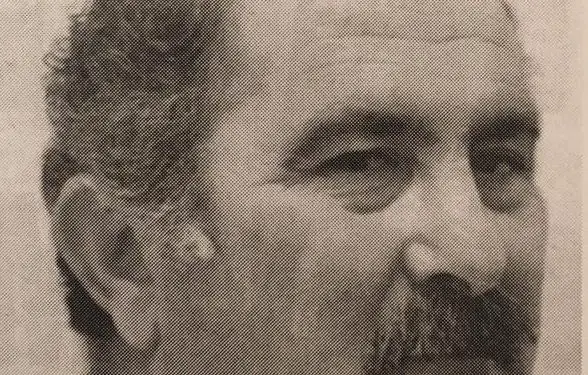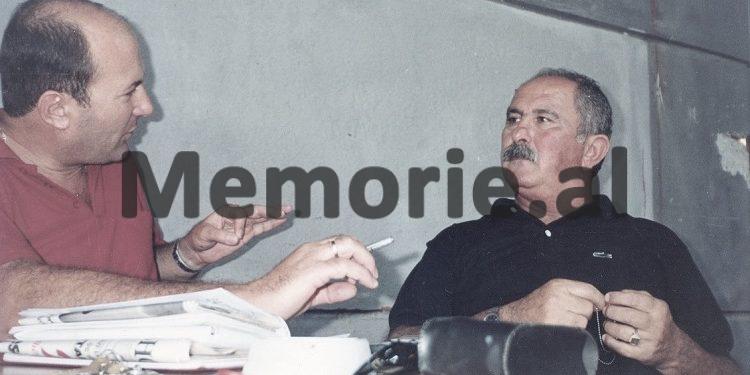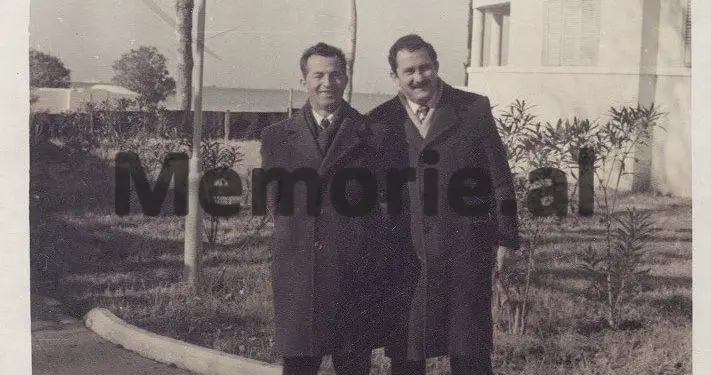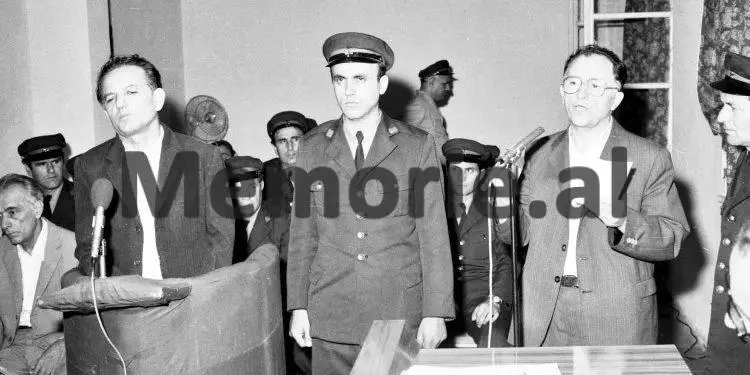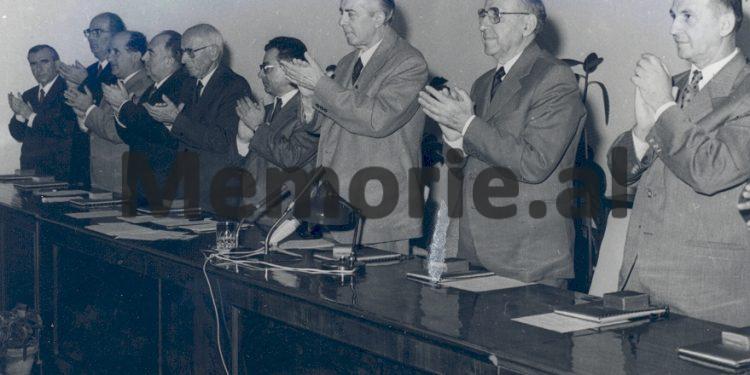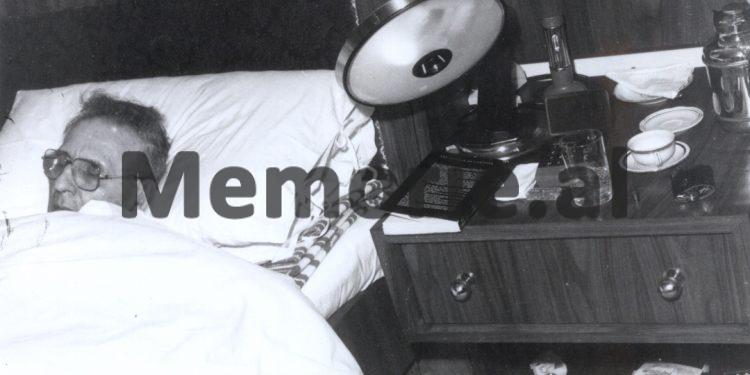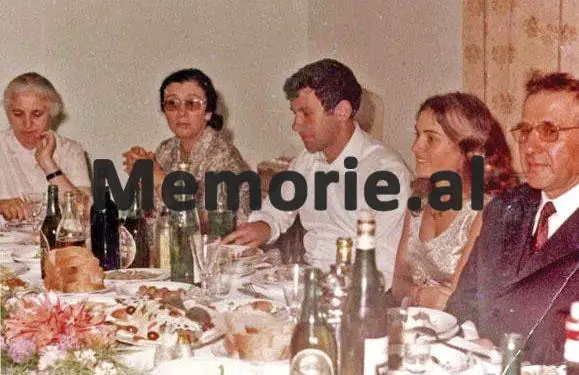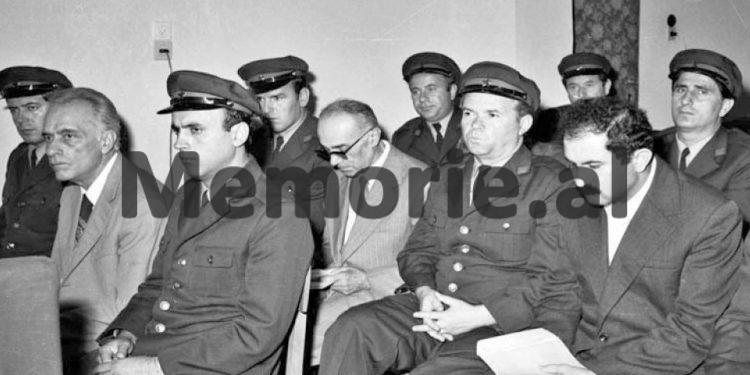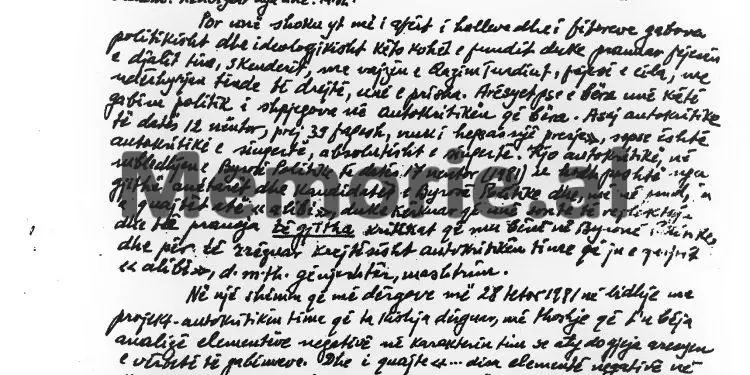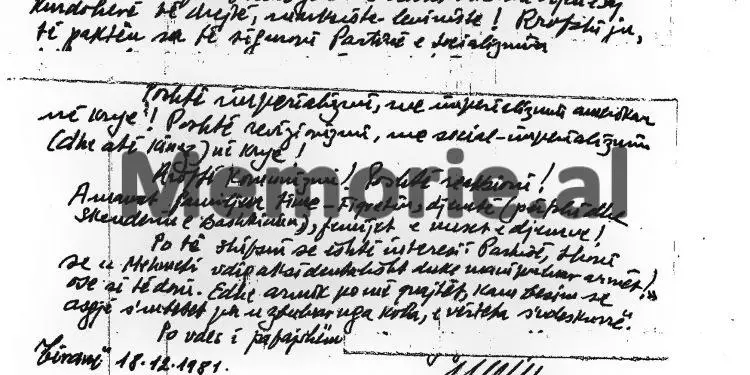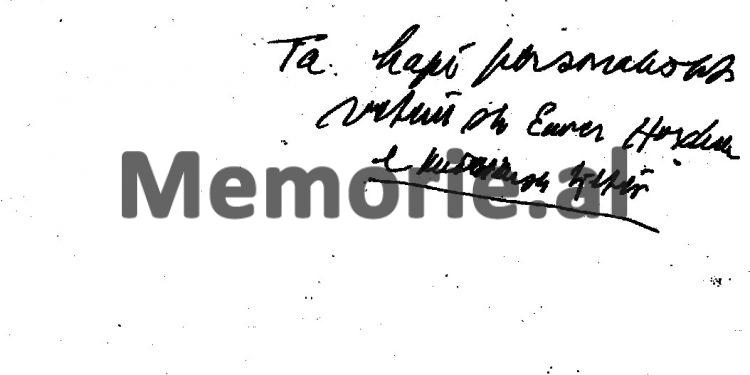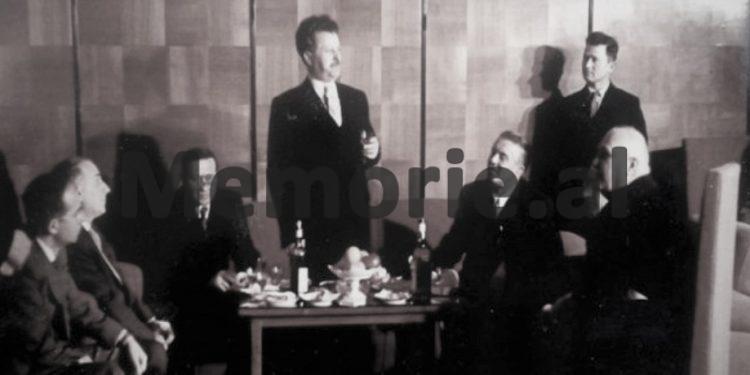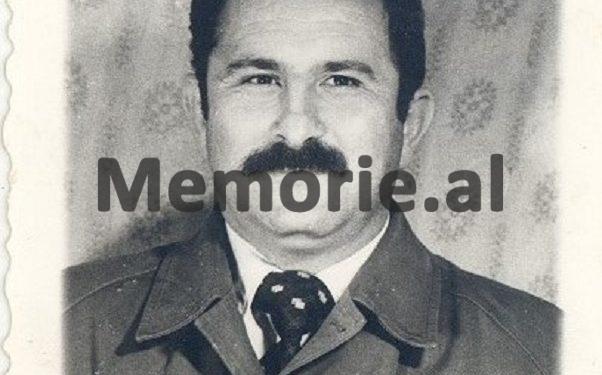Dashnor Kaloçi
Second part
Memorie.al publishes some of the unknown stories of the former prime minister during the life of communist Albania, Mehmet Shehu, told by the former bodyguard and commander of his escort group, Ali Çeno, regarding his boss’s relations with Enver Hoxha and some of the most talked about events that continue to be shrouded in mystery even today, four decades after his elimination, such as those on the evening of December 17, 1981, when Ali Cheno accompanied his boss home after the meeting. of the Politburo, where he was severely criticized by Enver and most of its members and the morning events of that night, when the Albanian Prime Minister was found lifeless in his bedroom!
Rare testimonies of the former bodyguard of the Albanian Prime Minister, starting from the events of 1974, when Enver tried to bring Mehmet into conflict with Beqir Balluku and other former generals who were shot, Enver’s contradictions with Mehmet since 1976, which brought a cooling between them and also Fiqret and Nexhmija, so much so that the holidays did not bring those two families together as they had always done, (the conflict which was reflected in both groups of escorts led by Sulo Gradeci and Ali Çeno), fierce debates of the two highest leaders of communist Albania, in the spring of 1981, when demonstrations began in Kosovo, the events of autumn 1981 after the engagement of Mehmet’s second son, with ” the girl with a bad biography ”, where Enver and Nexhmija went to congratulate and why they took out the photographer of the Prime Minister’s family, the debates about the break-up of that engagement after Enver ordered Mehmeti to return urgently from Korça… ?!
The meeting of the Politburo on the afternoon of December 17, 1981, and the special orders given by Prime Minister Shehu to his bodyguard, for the service group that was guarding the villa that night, who and why informed Cheno to go there that night on duty, which had never happened before… ?! How Ali learned on the morning of December 18 what had happened to his boss, what Vladimir, the eldest son of the Shehu family, told him before he entered the prime minister’s bedroom, Ali’s telephone conversation with Ramiz Ali and his response, the role of Kadri Hazbiu in that event, the inhuman tortures that the investigator Sokol Koleka inflicted on Ali during the investigation process and what he asked him to say about Enver Hoxha, the version that Cheno gives, about the way, the mechanism and the people who took part in the assassination of former Prime Minister Shehu, and why does he accuse Ramiz Alia, as the executor of that plan that was previously conceived by Enver Hoxha ?!
“The meeting of the Political Bureau of the Central Committee of the ALP, ended there around 20.00 in the evening and immediately after that, Mehmeti, very nervous as rarely ever, hurried into the studio of his house and threw the bag at the door , which fell to the floor. I immediately sat down to pick him up to put him in the place where he usually kept him, but he said to me: ‘Leave Ali damn, leave…’! Seeing him in that very shocked state, to calm him down somewhat and calm him down, I said to him: ‘Whenever we are criticized, we should not do so’. After that, he turned to me and said: ‘Why did you take Ali, do you compare yourself to me…?! Did you not hear what the little ones were doing at the meeting, like a parrot ‘?! (He was talking about the meeting of the Politburo that had just ended, where almost all its members, instigated by Enver Hoxha, severely attacked him with various accusations). After a while, around 8:45 pm, from the work studio where he was alone and I at her door in the corridor, Mehmeti called Enver and said: ‘Comrade Enver, can I only come for five minutes, to copy some things… ‘? I did not hear what Enver answered on the other side of the receiver, but I learned that the next day from Fiqret. Before I left him, to go to my house, Mehmeti addressed me: ‘Ali, beware of the service, lest evil come from where it awaits’. I had a clear idea of why he was speaking, and before I left, I shared the assignment with the service group, headed home, only to return home after a phone call from one of the escort group members, and I slept in the service room. The next morning, after I pulled out the Benz and got it ready to take the boss to the Bureau meeting, I heard screams from the second floor of the villa. Then, Vladimir, the eldest son of the family, came out and asked me and the doctor (Llesh Rroku) to go upstairs quickly. Ladi pointed her finger from the bedroom and, trembling, said to me: ‘Ali, go and see my father!’! I immediately got in there and for the moment, I remembered that he had fainted. I immediately measured his pulse and saw that he was finished… ”!
This is how Ali Çeno, the bodyguard and former commander of the escort group of the communist Prime Minister of Albania, Mehmet Shehu, and one of his most trusted people, remembered on the night of December 17-18, 1981, when he met and accompanied the chief. on his way home, after the meeting of the Politburo, where Mehmeti was called to account, regarding the engagement of his second son, Skënder…! After that, Ali was silent for a moment and his eyes almost filled with tears. “This is how my flesh growls…”, he told us, as he remembered his former boss, the longest-serving prime minister in the history of the Albanian state, whom he served faithfully for ten years and for the first time showed us all the behind the scenes that led to the fatal night of December 18, 1981, when the Albanian Prime Minister, who had ruled the country with an iron fist for 27 years, was found dead in the bedroom of his villa, at the entrance of “Bllok” , just a few steps away from the building of the Central Committee of the ALP and the great palace of Enver Hoxha, whose shadow seemed to cover it every sunset…!
As well as when the contradictions between Enver Hoxha and Mehmet Shehu first arose, who was the minister who testified about the fierce conflict between them in 1954, when after the closure at home guarded by his loyal former partisans from Mallakastra of the Brigade First Attacker, Mehmeti, got ready to go up the mountain ?! What accusations had been made against Prime Minister Mehmet Shehu that day on December 18, 1981, at a meeting of the Politburo and what he had talked about with the son of former Minister King Zog during a visit he had made as Prime Minister to the town of Cërrikut ?! Why did Mehmeti ask for a meeting with Enver Hoxha that evening, a few hours before the mysterious event and what was the answer he received from him?! Ever since the contradictions and big rift between them had started, which led to the irreparable conflict of that fatal night at that end of December, and was it related to the heated debate that had taken place between them in front of the Party House as they left the building of the Central Committee of the ALP in March 1981, when the demonstrations had started in Kosovo and Mehmet Shehu had asked Enver to take the tanks to the border with Yugoslavia?
What were Mehmet’s relations with Ramiz Alia and why did they break up just a few days after the ceremony performed by the two families Shehu and Alia, in the villa of Dajti Mountain?! What had Enver Hoxha plotted, when together with Nexhmija, they went to visit the Shehu family, to wish the engagement of the son, Skënder, with the daughter of the Turdiu family and why they took out the photographer of the Shehu family (Dashamir Rrapin), by do not let him take your pictures? Why did Enver urgently call Mehmet from the meeting in Korça in October 1981 and what did he ask of him in his house, which Mehmet categorically opposed in the fierce quarrel that broke out between them?! Why on the evening of December 18, Mehmeti ordered the commander of his guards, Ali Chenon, to: be careful, that danger could come to you from where they were waiting?! What did he mean by that message and why was Ali Cheno called that night to go to sleep there, which he had never done before during the entire period of nearly 10 years he served in that position?!
Why did Ali Cheno insist, saying: his boss did not kill himself, but was killed by another man, who entered the night through the front door of the villa, collaborating with one of the officers of the internal service?! How did Ramiz Alia react when Ali informed him of what had happened to his boss? What was in the glass that Ali saw on Mehmet’s bedside table and why did it disappear immediately, after a group of forensic experts entered to inspect the scene?! Was Kadri Hazbiu implicated in that event, what was his position on the investigator and what did Kadriu say in the trial about Mehmet Shehu and the trial panel? What did investigator Sokol Spiro Koleka ask investigator Ali Çeno during the investigation process and why did he have to admit that: his boss Mehmeti, had charged him (Ali) to assassinate Enver Hoxha?!
About these mysteries where most of them are unknown and previously unpublished, as well as many other unknown events and facts related to the longest-serving former Prime Minister of the Albanian state, Mehmet Shehu, as well as relations and reports with Enver Hoxha, are made public by the testimonies narrated exclusively by Ali Çeno, former bodyguard and commander of his escort group, which Memorie.al publishes for the first time for its readers in several issues of the dossier section.
Continued from the previous issue
Cheno: Enver tried to confront Mehmet with Balluku and former generals who were shot in ’75
Regarding the so-called ‘military coup group’ led by the Minister of People’s Defense, Beqir Balluku, who were attacked by Enver Hoxha in 1974, the former bodyguard and commander of the group accompanying Prime Minister Mehmet Shehu, Ali Çeno, testified: “Even in 1974 when Enver Hoxha hit the senior military led by Beqir Balluku, accusing them of being conspirators, to unmask them, he first took Mehmeti through all the stands of those meetings that took place at that time. Although Mehmeti joined Enver Hoxha against the military group, he was never in favor of their physical elimination. Thus, after the defeat of Beqir Balluku, in the meeting that took place at Vila e Zogut in Durrës, Mehmeti spoke very well about Petrit Dumen and Hito Çako, saying that: they were talented soldiers who could lead the army very successfully and proposed for his deputy in the post of Minister of National Defense who had just been appointed after Balluk’s dismissal. “But they stayed only a short time in those tasks as Mehmet’s aides, enough to exchange them for Beqir Balluku and Mehmet Shehu himself to implicate them both, and then Enver ordered their beating and execution,” recalled Ali Cheno. , regarding the maneuver of Enver Hoxha to confront and implicate Mehmet Shehu with the senior military Balluku, Dume, Çako, etc., who were executed and other former generals who ended up in prisons and internments accused of being coup plotters.
Cheno: Mehmet leaned from the West
Ali Çeno, Mehmet Shehu’s loyal bodyguard, testifies that since the early 1970s, his chief, the prime minister of communist Albania, had often mentioned the West in conversations. In this regard, Cheno recalled: “Mehmeti often boasted that he had graduated from the Fultz American Technical School and always cited examples from the West when he wanted to talk about work discipline. He often said to me: ‘Listen Ali, if we did not manage to have the discipline of work that the West has, we do not have it in line. Here, one man works and eats five others at his own expense, while abroad, everyone works and gets paid for the work he does himself. ‘ In addition, Mehmet increasingly displayed his tendencies to soften the class struggle to the maximum. He openly displayed this on many occasions. I remember one of the visits he made to the small town of Cërrik, in the mid-1970s, on the occasion of the inauguration of an exhibition of agricultural machinery organized by the Mechanical Plant of that town. After Mehmeti saw all the machines that had been modified by the mechanics of that factory, he liked one of them and asked to meet the mechanic who had done that rationalization. At first the senior leaders of the district and the factory that accompanied him, hesitated to bring him, but then they brought him and Mehmet hugged him, congratulating him on the work he had done. After that he asked him his name and he answered by saying his name, if I am not mistaken Mërgim Korça. Mehmeti asked him again what was wrong with Xhevat Korça (former minister in Zog’s time) and when he replied that it was his son, Mehmeti said: Come closer to hug you and kiss your hands once more. As Mehmet was embracing him, whispers were heard from the whole crowd of people who were there. He immediately addressed those who accompanied him and all those present that were there, saying: ‘You will say how much you are combing this boy’s tail. But know that this guy, having that marital status you know and you, has worked and done this miracle you see here. Why don’t our children do this, but they cannot do it, because the schools and diplomas they have, have taken them under our umbrella. You mean, what about the class war?! Here I am telling you: I hated the class war ‘. From that time on, Mehmet did not prevent his children from associating with friends who had problems with their biographies. Thus, the second son, Skënderi, had some close friends who had big problems in their biographies and he often took them to his house in Bllok. Mehmeti, although he knew who they were, told you with a laugh that: they had five or six criminals in the tribe, but he never told Skënder not to associate with them, or to bring them home. “All this, especially his meeting with the son of the former Minister of Zog in Cërrik, was raised as accusations at the meeting of the Politburo on December 18, 1981”, recalled Ali Çeno, the tendencies of his boss to always take as example the West and the mitigation of the class war, so much so that, he met and publicly embraced the son of the former minister King Zog, congratulating him on the good work he had done as a mechanic.
The big rift between Enver and Mehmet in 1976!
Ali Çeno testified that by saying that: although the conflict between Enver and Mehmet had been open for years, the contradictions between them became more acute after 1976. In this regard, he recalled: “The big rift in the relations between Enver and Mehmet started there in 1976. I do not know what was the cause of the breakdown of relations between them, but they became so irritated that they no longer met each other, except in official meetings. After that year, they no longer spent their holidays together as usual in Durrës, Vlora, or Pogradec, as they had done until then. After that year, they rested separately and the rift between them reflected between Nexhmija and Fiqëret, as well as their children. Even this cooling between them, reflected in the two groups of escorts led by me and Sulo Gradeci. Except for Behar Zhurda whom I met normally, since I had a friend and he was a good man, none of the officers of one group are associated with the escort officers of the other group. This coldness between Enver and Mehmet that happened at that time, had consequences for Mehmet and in the meetings of the Politburo or the Government when he participated and Enver Hoxha, where many criticisms started in his address, which had never happened again first. These criticisms for various problems were made by Enver Hoxha, but also by others that he encouraged, especially when Muho Asllani, Pali Miska, or Lenka Çuko came to government, whom Mehmeti could not stand at all. When he was sometimes angry with them, he would exhale as if to himself, saying: ‘Can a coachman or a miller run the Albanian economy’?! “He used to say these words to some of his confidants,” Ali Cheno recalled, the contradictions between his boss and Enver Hoxha, as well as Mehmet’s dissatisfaction with Enver, for the people he had brought to the government from the working class.
Enver’s fierce conflict with Mehmet for Kosovo in March ’81
After the ’90s, it has been said by various sources that back in March of ’81, there was a fierce controversy between Enver and Mehmet, which almost went to the brink of strife. This was confirmed by Ali Çeno, who was present in that unusual situation between the two main leaders of the Albanian state. In this regard, he recalled: “In March or the beginning of April 1981, Enver and Mehmeti had just left the building of the Central Committee of the ALP and, walking, stopped in front of the Party House, arguing with each other so loud that their words were heard not only by us escort group officers, but also farther away. Mehmeti addressed Enver, saying: ‘Let us announce the general mobilization today and launch the tanks towards the North on the border with Yugoslavia. We cannot stand idly by here, when people are killed there. A general mobilization would attract the attention of the West and the Kosovo problem would be easier to solve. If the need arises, let us start the war. We have nothing to look forward to. After these words, Enver answered in the same high tone: No, we can never do that. We cannot destroy in one day what we have built for forty years… ‘!
Although it is not known exactly when the disputes and conflicts between Enver Hoxha and Mehmet Shehu started, one thing is certain that they both never loved each other, but for almost forty years they managed to cooperate depending of the conjunctures and interests of each. Many of their close collaborators have testified about Enver-Mehmet relations and conflicts. According to the testimony of Idriz Seiti (former State Security Colonel in the Ministry of Internal Affairs) one of Mehmet’s close relatives, the beginning of the conflicts between them dates back to August 1942, when Mehmet Shehu had just returned to Albania from the concentration camp of France, where he had been interned because of his participation in the Spanish War. At that time, Mehmeti, after being well informed about Enver’s role at the head of the Albanian Communist Party and after reading its first tract, said: “This work has ended, because the leadership of the war has been taken over by the traitors After that, Mehmeti drafted a political sketch-program, with a social-democratic tendency and completely opposite to the SNP treaty. For this program, which he kept for 40 years in his safe, after the event of December 18 in 1981, when Enver launched a crackdown on the now-deceased former Prime Minister Mehmet Shehu, the main accusation against him was: “After his death, Mehmet Shehu was found with documents in his safe, proving that he was an agent of the West.”
Testimonies of Tito’s envoy to Albania during the war and of the former minister without portfolio of the Albanian government who fled to Yugoslavia in 1958, for the fierce Enver-Mehmet conflicts
Regarding the contradictions and conflicts Enver-Mehmet, about which Ali Çeno testifies in his story, the former bodyguard and commander of the escort group of the former Albanian Prime Minister, Mehmet Shehu, have testified and some other well-known characters with senior functions, indicating that they have begun since the War period. In connection with this, he sheds light on a letter which is located in the Central State Archive in Tirana, which Enver sent to Dushan Mugosha (under the pseudonym ‘Sala’) in 1943. Among other things, in that letter, Enver i write: “Tuku (Jakova) is not very pleased with Mehmet. Do not assume that I am writing this as an apostate and with a tendency for Mehmet, but Tuku reports that after your departure, Mehmet did not ask about anyone at all and before the meeting of the Brigade, he underestimated the action against Haki Blloshmi (Balli commander) “. As can be seen from this letter, Enver has previously complained to Dushan about Mehmet, and therefore justifies himself, saying that he does not write that letter with tendencies and apostrophes about him. , is also Njazi Dizdarevic, a former member of the Central Committee of the Yugoslav Communist Party and Tito’s envoy during the war in Albania.In his book “My War in Albania”, published in 1988 in Belgrade, Dizdarevic writes, among other things. “After Nako Spiro insisted that we influence the removal of Enver Hoxha, after the war Mehmet Shehu came to our mission and met with Mayor Velimir Stojnic. After complaining about Enver Hoxha, he asked him to of he intervened for Enver to treat him as he deserved, because until then, Enver had underestimated him with the position he had given him in the Army and the treatment in the Party “. The contradictions between Enver and Mehmet, which had started during the war, continued even after the liberation when they were both in the highest positions of the Party and the state. According to the testimony of Major General Panajot Plakut, (Deputy Minister of Defense who fled to Yugoslavia in 1957 when he was Minister without Portfolio) published in his book “Violence on the Revolution in Albania” (p. 74 (Belgrade 1966), relations between Enver and Mehmet were significantly strained around 1954-’55 when Mehmet was dismissed from the post of Second Secretary of the Central Committee of the ALP and appointed Prime Minister. Among other things, regarding this conflict, in his book, Panajot Plaku writes: “Mehmet Shehu, doubting the motives of this change, thought that this was not the first step that Enver Hoxha was taking towards his liquidation… This became the main cause of serious conflicts between them in several consecutive meetings of the Politburo. However, since Enver Hoxha did not change his decision, (for the dismissal of Mehmet from the second Secretary of the Central Committee of the ALP.) Mehmet Shehu was locked for a long time in his villa, guarded by his partisans most loyal to Mallakastra, who were colonels in the Ministry of Interior. After these quarrels that continued for a long time, Mehmeti told me and Sadik Bocaj that as a result of that conflict, he almost fled to the mountains. Since the conflict was not eliminated but continued in several meetings of the Politburo becoming more and more irritated, Mehmet Shehu went to the then Soviet ambassador and complained against Enver Hoxha. After that, the Soviet ambassador met with Enver Hoxha and a meeting of the three was organized, in which Enver Hoxha and Mehmeti agreed “, concludes his testimony Panajot Plaku, former commissioner in the Battalion in the First Assault Brigade of Mehmet Shehu and one of the harshest critics and accusers of Enver and Mehmet, made in his book, after he fled Albania and sought political asylum in Belgrade, where he died in suspicious circumstances in 1966. /Memorie.al
The next issue follows




